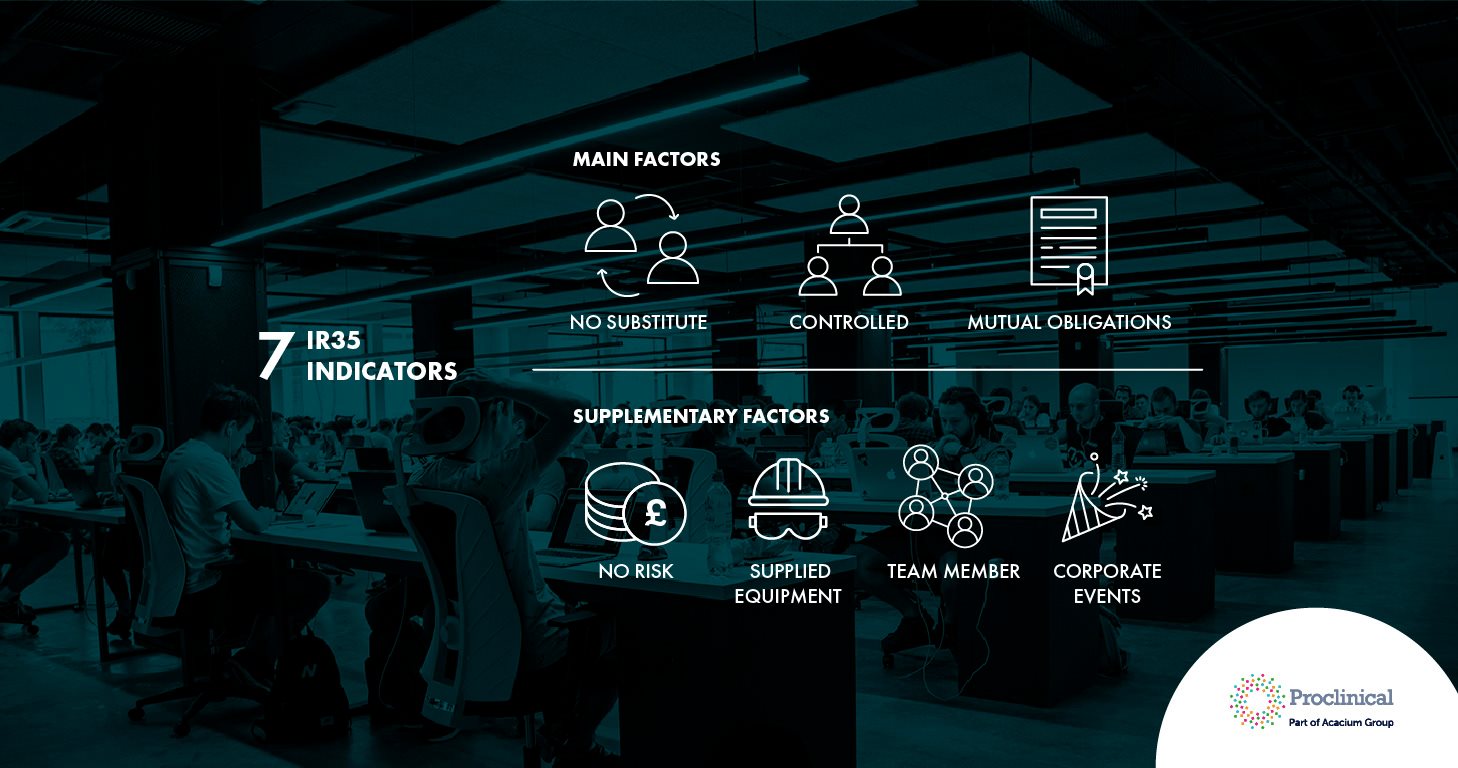
Updated 5th February 2021
The UK’s off-payroll working rules are set to change on 6th April 2021, affecting all medium and large-sized organisations that whose contractors operate through personal service companies (PSCs) as well as the individuals themselves and the recruitment agencies who supply them.
At Proclinical, we are well-prepared and well-positioned to assist our partners in the life sciences industry with preparing for the changes and offer support and peace of mind to contractors concerned about how the changes might affect them.
Below, you will find information and resources to help you understand and prepare for the change, and our team are on-hand to discuss solutions, opportunities and any concerns you have via our dedicated mailbox IR35@proclinical.com.
BACKGROUND ON IR35
The off-payroll working rules have been in place since 2000 to ensure fairness between individuals who work in a similar way. They are designed to make sure that an individual who works like an employee, but through their own limited company, pays broadly the same Income Tax and National Insurance contributions as other employees. The rules do not apply to the self-employed.
This measure will apply to engagements with medium or large-sized organisations in the private and third sectors. It will shift responsibility for operating the off-payroll working rules from the individual’s PSC, to the organisation or business that the individual is supplying their services to. This includes responsibility for deciding whether the rules should apply and deducting the associated employment taxes and National Insurance contributions. (Source: www.gov.uk)
What are the off-payroll working rules?
Over the coming months organisations across the United Kingdom will be preparing for the changes to the off-payrolling working rules (IR35) which are due to take effect from 6th April 2021.
Currently, the liability sits with the contractor who is responsible for making the Status Determination on whether they are in or outside of scope regarding IR35.
As of 6th April, the changes directly affect the End User (the Client) who will take the responsibility and liability for providing a correct Status Determination.
Why are the changes to the IR35 rules being introduced?
These rules are to prevent workers from “disguising” themselves as freelance contractors as a way to pay less tax. This anti-avoidance legislation targets contractors providing services through a limited company, when in practice they are doing the same work as if they were employees.
In HMRC’s eyes, if a service provided by a contractor resembles full-time employment, the contractor falls inside IR35 and should therefore pay tax like a full-time employee.
How will IR35 affect me?
The April updates to the off-payroll working rules will affect people differently depending on their circumstances. Contractors ‘caught inside IR35’ may face additional tax liabilities and should seek professional guidance on how it might affect their income if they decide to continue in their current role.
For businesses, one-off costs could include familiarisation with the changes, upskilling staff in making status determinations and determining whether the rules apply to their existing off-payroll engagements. Ongoing costs could include making status determinations for any new off-payroll engagements and maintaining a status disagreement process for off-payroll workers who seek to challenge their status determination.
Organisations that engage PSCs directly will be additionally responsible for deducting tax and National Insurance contributions and remitting it directly to HMRC for these engagements through RTI.
However, with relatively small changes to the way they operate and set up their relationships with the contractors, companies can remain compliant with the new legislation, and Proclinical will work closely with our partners to minimise the impact that the changes will have.
What can a business using PSCs do to prepare?
Businesses using PSCs will need to determine which individuals will be in scope, understand the financial and human capital impact on the business, and may need to implement new recruitment procedures.
Preparation starts with a full review to identify who will be bound by the new rules. There are 7 key indicators used to identify workers inside scope, however assessment must be done on a case-by-case basis through an accumulation of detail, and not through blanket determinations or checklists exercises.

Our downloadable IR35 guidebook is designed to help companies with clarification around these rules and provides examples of real-life legal cases where determinations by HMRC have been successfully challenged, setting a precedent that will help guide you in your decision making.
WHAT CAN A CONTRACTOR OPERATING THROUGH A PSC DO?
If you are caught by the proposed changes to the IR35 rules, or on a short-term contract, a PAYE scheme could be the easiest way to work. However, this would not include employee benefits. It may therefore be beneficial to use an umbrella company, as some of them are able to provide a comparable set of fulltime employee benefits to contractors. We have outlined some the advantages and disadvantages of contracting via an umbrella company below.
Advantages of Umbrella Companies:
- Seen as the “hassle-free” way of contracting. You can be up and running in a matter of hours when working with an umbrella provider.
- You won’t need to deal with the admin or paperwork burden, such as dealing with accountants, HMRC or Companies House.
- Umbrella companies can offer a low-risk way of trying life as a contractor. You can easily form a limited company later if you choose.
- The umbrella company takes care of all your invoicing, administration, chasing payments and most importantly processing payroll with the required deductions.
- If you stay with an umbrella company, it will offer them continuation of service/employment.
- With a good umbrella company, you will be fully supported by its HR function in the event of a grievance or disciplinary procedure, be entitled to a package of employment rights and have access to a range of affiliate offers such as discounts on financial and legal products plus other contractor benefits.
Disadvantages of Umbrella Companies:
- Umbrella companies do not have the tax benefits associated with limited companies. If your role is outside of IR35, the Umbrella Company will deduct PAYE and NICs from your salary, together with your weekly or monthly timesheet processing fee.
- You don’t have control over your affairs to the same extent as a limited company contractor does.
- Contractors need to beware of some umbrella companies who claim that the contractor can make money from expenses claims. A contractor can only claim back expenses which have been genuinely incurred during the course of their contract duties.
- Some umbrella companies are based in tax havens which can put you, the client and Proclinical at risk of not declaring the right levels of taxation required.
- The use of loan charges to bypass taxation laws which will put you at risk to pay back taxes that are owed.
At Proclinical we have a fully vetted list of umbrella companies that offer a compliant employment solution to contractors working in the UK, so whichever route you wish to take, we are perfectly placed to help.
HOW CAN PROCLINICAL SUPPORT YOU?
- Outsourced Contract Payrolling
- Managed Services Provision
- Consulting
- Statement of work
- Functional service provision
- Permanent Staffing
- IR35 status determination
Our client services team will work with you to understand your needs and deliver a tailored solution that’s right for you.
For support or to book a consultation, get in touch with us by emailing IR35@proclinical.com.




















